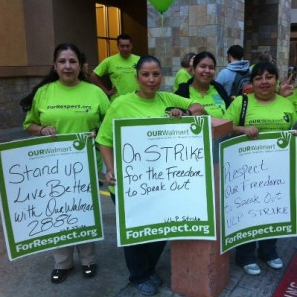VOICES: Presidential politics vs. workers' rights

By Joe Atkins, Labor South
Just a couple weeks to election day, and Americans will see how far Big Money can determine the political future of this nation.
The world has changed since the U.S. "Corporate" Supreme Court's Citizens United ruling two years ago. Reporter Lee Fang told the story of that change in a recent edition of The Nation magazine. In the pharmaceutical industry alone, spending on federal elections jumped from $200,000 in 2008 to nearly $10.4 million by the very next election cycle. Fang says 98 percent of it came "from undisclosed corporate sources."
Money can't buy everything. After all, a $222 million payroll, the fattest in all of major league baseball, couldn't buy the New York Yankees entry into the World Series this year. In fact, the Yankees utterly flopped in the American League Championship Series, losing 0-4 to the pennant-winning Detroit Tigers and their venerable manager, the great Jim Leyland.
Of course, we're talking politics, not baseball.
I plan to be writing at greater length about the election in the days ahead, looking at the billionaire Koch Brothers and whether they have enough cash to buy the White House as well as assessing other issues such as former President Bill Clinton's role in the Obama candidacy.
Unlike nearly all of my Democratic and liberal friends, I am absolutely no fan of Bill Clinton. He and his old club, the Southern-dominated Democratic Leadership Council, nearly cut the heart and soul out of what was left of FDR's Democratic Party, charting a centrist, Republican-like path that paid scant attention to labor and working-class voters while raking in big bucks from Wall Street.
MSNBC's Chris Matthews, always full of hagiographic praise for Clinton, will be the first to tell us the former president deserves a ton of credit if Obama wins. I won't buy it. If Clinton does indeed have the magic appeal to working class folks that Matthews claims, it certainly doesn't have to do with anything he ever accomplished on behalf of working people.
Working people don't have a lot of political leaders who'll fight the good fight for them. Obama comes a lot closer to such a leader than Clinton ever will. Still, by and large, working people have to get out and do the fighting themselves.
And they are.
Arkansas-based Walmart, already fending off protests and worker walkouts in a dozen or more states, now faces a possible class action lawsuit for allegedly breaking federal minimum wage and overtime laws. A suit was filed this week in a federal court in Illinois claiming, among other things, the giant retailer failed to maintain accurate records of its employees' working hours, and that employees from Walmart's staffing agencies weren't paid for work that they did.
A group called OUR Walmart is helping organize another walkout just one day after Thanksgiving. Walmart typically does more business that day than any other day in the year, the Associated Press reports.
Down in Louisiana, a hundred workers with the Carey Salt company of Cote Blanche won a victory with the National Labor Relations Board. The NLRB ruled that the company "forced the miners into an unfair labor practices strike, and then illegally refused to take them back when the miners, represented by the Steelworkers, offered to return to work," according to labor writer Mark Gruenberg in People's World.
Carey Salt is a salt mine operation whose parent company is North American Salt.
The NLRB's 3-0 (including the board's Republican member!) ruling forces the company to go back to the bargaining table with workers' representatives to work out a new contract. It also requires that Carey get rid of the workers it hired to replace union members, put those union workers back on the payroll, and give them back pay.
(Photo from OUR Walmart website.)
Tags
Joe Atkins
Joe Atkins is a professor of journalism at the University of Mississippi and author of "Covering for the Bosses: Labor and the Southern Press." A veteran journalist, Atkins previously worked as the congressional correspondent with Gannett New Service's Washington bureau and with newspapers in North Carolina and Mississippi.
